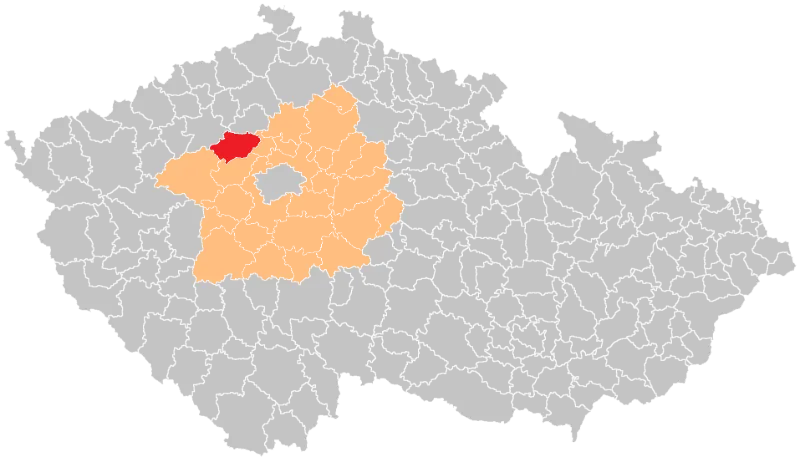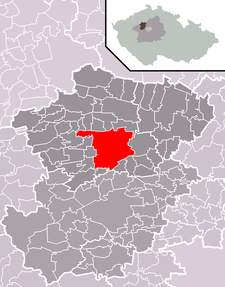
Source: wikipedie




Archaeological findings confirm the prehistoric settlement of the town and its surroundings since the Early Stone Age. Larger settlements are also confirmed by findings from the 8th and 9th centuries, especially on the southeastern slope of Slánská hora and its foothills.
The origin of the town’s name is linked to a story from the chronicle of Václav Hájek of Libočany, which tells of the discovery of a salt spring at the foot of Slánská hora by Prince Nezamysl’s servant Holot and the subsequent founding of the settlement “Slanej vrch”.
The first written record of Slaný is from 1262, in which Přemysl Otakar II names Slaný among the towns that paid a ninth part of the market fees to the Monastery of St. George at Prague Castle.
At the turn of the 13th and 14th centuries, Václav II granted the city of Magdeburg law and it was probably he who elevated Slaný to a royal city with the right to use the emblem with the figure of a two-tailed silver Ivo with a golden crown and armor in a red field.
At the beginning of the Hussite storms, the city, along with Pilsen, Žatec, Louny, Písek and Klatovy, was one of the cities that was the only one to be saved. In May 1420, the people of Slaný, together with those of Louny and Žatec, set out to help Prague, which was taken advantage of by Vilém Zajíc of Hazmburk and, with part of the crusader army, he took control of the city by trickery. The return to the old order was marked by the visit of Emperor Sigismund to Slaný.
From the middle of the 15th century, the city leaned towards the unity of Poděbrady and the people of Slaný remained loyal to George of Poděbrady even during his reign. The economic development of the city continued under Vladislav Jagiellonsky and in the early days of the Habsburg rule.
The growth of the city stopped only after the defeat of the Bohemian Estates at Bílá Hora, when the local population sided with the defeated. As the only royal city, it was punished by being mortgaged in 1623 and in 1638 sold to the Count of Smeče into hereditary ownership of the Martinic family. It remained in servitude until 1794, when it was freed and placed under the protection of the nobility. From 1.1.1796, Karel Josef Clam-Martinic became the first protective lord and the city remained under protective status until 1848. After the revolution, Slaný became the seat of a political and judicial district. The C.K. hetmanship began to operate on 15 February 1850.
From roughly the middle of the 19th century, Slaný revived with a great development of industry focused primarily on the needs of the promisingly developing agriculture. The development was interrupted only by the two world wars.
Since 1960, the Slaný district has been abolished and its larger part, including the town of Slaný, has been merged into the Kladno district. After the abolition of the districts, it is part of the Central Bohemian Region.

Other interesting places and important monuments from the nearby metropolis
Smetana Theater (1886-1887, New German Theater)
Theater in Vinohrady (1905-1909, “Vinohrady Theatre”)
Czech Radio Building (1929-1931, Czechoslovak Radio)
Hlavní nádraží (1901-1909, Emperor Franz Josef I., Wilsonovo, Hlavní nádraží, Wilsonovo)
National House in Vinohrady (1893-1894, formerly ÚKDŽ, later KDŽ)
Vinohradská falconry in Riegrovy sady
Vinohradská tržnice (1902), one of the Prague markets
Water Tower (1891)
Vinohrady Cemetery (1885)
Chapel of St. families (1755)
Hus’ Choir (1932-1935)
Church of Saint Ludmila (1888-1893)
Church of the Sacred Heart of the Lord (1928-1932)
Archbishop’s High School in Prague
Václav Hollar Art School
The Čapk brothers’ semi-detached house (1928-1929) in the villa colony of the Association of Journalists (1923-1929)
Gröbe’s villa (1871-1888, Villa Gröbe, “Grébovka”), with Dolní Landhauska and park
Kotěr’s villa (1908-1909)
Laichter House (1908-1909)
Schnirch House (1875)
Šaloun’s Villa (1908-1909)
Villa Osvěta, birthplace of Jan Masaryk
Abychom poskytli co nejlepší služby, používáme k ukládání a/nebo přístupu k informacím o zařízení, technologie jako jsou soubory cookies. Souhlas s těmito technologiemi nám umožní zpracovávat údaje, jako je chování při procházení nebo jedinečná ID na tomto webu. Nesouhlas nebo odvolání souhlasu může nepříznivě ovlivnit určité vlastnosti a funkce.
Penzion Homér Slaný
Vánoční a novoroční provoz recepce
Ve dnech 24.–26. 12. 2025, 31. 12. 2024 a 1. 1. 2025 je recepce otevřena do 17:00.
Prosíme hosty s plánovaným příjezdem v uvedených termínech, aby kontaktovali recepci předem a domluvili si čas příjezdu.
Děkujeme za pochopení.
Christmas and New Year Reception Hours
On December 24–26, 2025, December 31, 2024, and January 1, 2025, the reception is open until 5:00 PM.
We kindly ask guests with arrivals scheduled on these dates to contact the reception in advance to arrange their arrival time.
Thank you for your understanding.